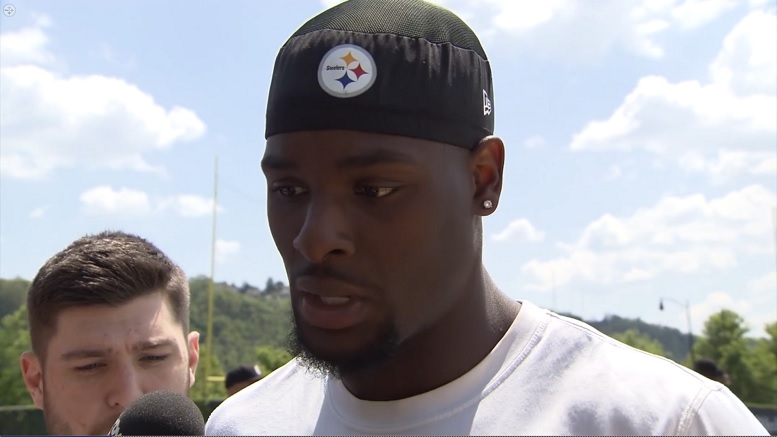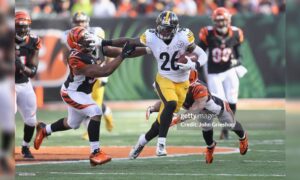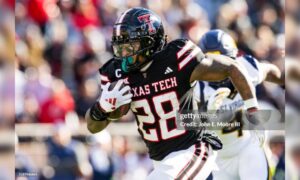Are you ready for some positive news concerning Pittsburgh Steelers running back Le’Veon Bell? According to documents obtained by TMZ, Bell has now officially successfully completed his 15-month probation and thus his marijuana possession and DUI charges have reportedly officially been expunged from his record.
In February of 2015, Bell was admitted into the Accelerated Rehabilitative Disposition program for first-time, non-violent offenders after appearing before Common Pleas Judge Robert C. Gallo and at that time it was reported that his record would be cleared if he stayed out of trouble during his 15 month probation period. During that period, Bell was expected to abstain from drugs and alcohol, complete any recommended treatment and take a safe driving class. He also had his drivers license suspended for 60 days. All of this stemmed from his August 2014 arrest in which he a former running back LeGarrette Blount were pulled over while on their way to catch a team flight to an out of town preseason game.
On Friday, it was reported that Bell is expected to be suspended for the first four games of the 2016 regular season for allegedly missing “multiple” drug tests this offseason.
So why four games and why not longer?
For starters, and to the best of my understanding, Bell was automatically placed in Stage 2 of the NFL’s revised substance abuse policy when he pleaded guilty to DUI in 2014. Once a player is placed in that Stage, moving forward, one missed test, or multiple missed tests, results in a four-game suspension without pay. The league, however, has yet to confirm the initial report by ESPN of possible forthcoming suspension for Bell and that is likely because an appeal is in the process of taking place.
Below is what the NFL substance abuse policy has to say about Stage Two:
1.5.2 Stage Two
(a) Procedures
Compliance with Treatment Plan: A Player in Stage Two must comply with the terms of his Treatment Plan, if one is developed, in Stage One and as may be amended in Stage Two.
Testing: All Players in Stage Two will be subject to unannounced testing subject to the terms of this Policy. At the sole discretion of the Medical Advisor, a Player may or may not be tested; however, if he is tested, he may not be tested more than ten (10) times during any calendar month. Such testing shall include testing only for the NFL Drug Panel, except that tests for alcohol and other Substances of Abuse will be conducted as set forth in Section 1.3 of the Policy and/or if the Player’s Treatment Plan requires abstention from and enumerates testing for such substances.
Evaluation: A Player, while undergoing Stage Two testing, may be required to submit to further evaluation and subsequent treatment at the discretion of the Medical Director.
(b) Discipline for Stage Two Violations
First Violation: A Player in Stage Two who: fails to comply with his Treatment Plan or fails to cooperate with testing, treatment, evaluation or other requirements imposed on him by this Policy, both as determined by the Medical Director; or has a Positive Test Result for a substance other than marijuana will be subject to:
1. A fine of four-seventeenths (4 /17) of the Paragraph 5 amount in his NFL Player Contract if he successfully completed Stage One; or
2. A suspension without pay of four (4) regular and/or postseason games (including the Pro Bowl, if selected) if he did not successfully complete Stage One.
Second Violation: A Player who has a second violation in Stage Two will be subject to:
1. A suspension without pay of four (4) regular and/or postseason games (including the Pro Bowl, if selected) if he was previously fined for Stage Two noncompliance; or
2. A suspension without pay of six (6) regular and/or postseason games (including the Pro Bowl, if selected) if he was previously suspended for Stage Two noncompliance; and
3. Advancement to Stage Three.
(c) Discipline if First Stage Two Violation is for Marijuana
If a Player’s first Positive Test Result in Stage Two is for marijuana, the Player shall be subject to a fine of two-seventeenths (2 /17) of the Paragraph 5 amount in his NFL Player Contract. The discipline schedule set forth in (b) above shall thereafter apply for any subsequent violation in Stage Two (i.e., failure to comply with Treatment Plan; failure to cooperate with testing, treatment, evaluation or other requirements imposed by this Policy; or a Positive Test Result for any substance).
(d) Duration
A Player will remain in Stage Two for 24 months or two (2) full seasons, whichever is shorter, beginning from the later of his date of entry into Stage Two or the date of his violation within Stage Two. After 12 months in Stage Two, if the Player has not had any additional positive tests, within a reasonable time period, the Medical Director and Medical Advisor will assess the Player and decide whether he will be discharged at that time. Such determination shall be based on the Player’s compliance with the Program, clinical progress and negative testing record. If the Player is not discharged, the Medical Director and Medical Advisor will, after six months, assess whether the Player should be discharged at that time. After every such assessment, the Medical Director and Medical Advisor shall notify the Player in writing of their decision if they do not discharge the Player. Any decision to discharge a Player from the Program early as set forth in this Section shall be within the sole discretion of the Medical Director. Once a Player is discharged, he will be afforded he same status as a Player who had never by Behavior or a Positive Test been referred to the Intervention Program. Notwithstanding, without any notice a Player will be automatically and immediately advanced to Stage Three if while in Stage Two he has two violations.
(e) Completion of Stage Two
A Player who completes Stage Two without being advanced to Stage Three will be discharged from the Intervention Program, after which he will be afforded the same status as a Player who had never by Behavior or a Positive Test been referred to the Intervention Program. Notwithstanding, the Medical Director and Medical Advisor may agree to extend the period of Stage Two for any Player, provided that the Medical Director shall meet with the Player (in person or by telephone at the option of the Player) and Medical Advisor (in person or by telephone), at least 30 days before the expiration of the Player’s Stage Two term (unless the justification for the extension occurs less than 30 days prior to the expiration of the normal term). The purpose of this meeting is to inform the Player that his term in Stage Two will be extended and establish a time (no later than every six months after the normal expiration date) when the Medical Director and Medical Advisor will confer with the Player to review his situation. At each conference, the Player shall be informed what is expected of him during each extension period.
While not yet confirmed, one could easily speculate that Bell will be moved into Stage Three. A violation by Bell of the drug policy while in that Stage would result in a year-long ban for the Steelers running back, unless the first violation is for marijuana, in which case he would receive a 10-game suspension. It is believed that once players are placed in Stage Three that they will likely remain there for the rest of their careers.
Bell, as you have probably already figured it out by now, can likely forget about ever receiving a long-term contract extension from the Steelers and especially if he’s ultimately moved into Stage Three. His best-case scenario when it comes to staying with the Steelers past the 2016 season, the final year of his current contract, is him receiving the franchise tag ahead of the start of the 2017 league year. That, however, is far from being guaranteed to happen at this point and even if he was to remain clean from here on out and return from his suspension to play at an extremely high level.
The Steelers could decide to wear down as much tread on Bell’s tires as possible throughout the 2016 season and then let the running back sign elsewhere during free agency so that they can possibly receive a third-round compensatory selection in the 2018 NFL Draft.








